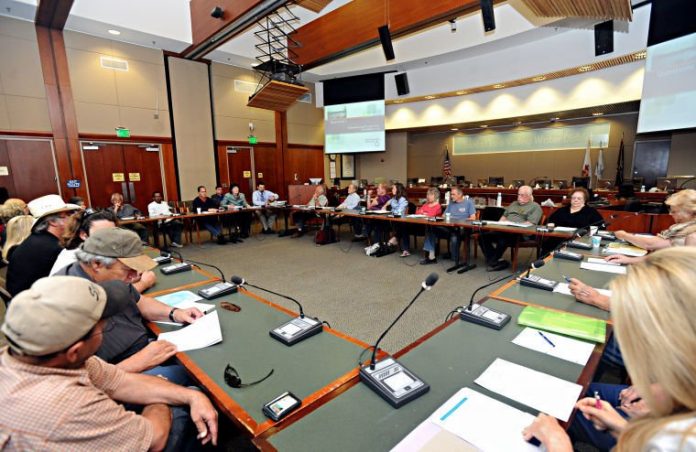
A contingency of Morgan Hill water users remains at odds with the Santa Clara Valley Water District over future restrictions they say could put their agricultural operations in jeopardy.
Uncertainty remained for surface water users of what’s called the Half Road Lateral after an April 14 workshop as local farmers and residents met again with district officials with no ultimate agreement between the groups.
“This is a critically dry year situation that has never happened before,” said Joan Maher, deputy operating officer of the district’s water supply division as she urged everyone to seek alternative water sources. “We really need everybody to have the flexibility to go to another source when these things happen.”
District officials are requiring zero allotment of water starting May 1 for most of the 38 locals who rely on the Half Road Lateral, a privately owned untreated water system connecting to and diverting water from the Cross Valley Pipeline as their sole water source.
Cross Valley Pipeline, which feeds federal water from San Luis Reservoir into Santa Clara County, will be closed for agriculture to provide an emergency reserve for cities and industries to use as drinking water during these ongoing drought conditions, according to the district.
Farmer options
Among options for local farmers include refurbishing any old wells currently on their properties or drilling new wells—both of which they claim are costly and not guaranteed to generate water.
“It’s a crapshoot,” said Andy Mariani, owner of Andy’s cherry orchard in Morgan Hill. You can dig three or four holes and come up empty.”
Mariani said he stands to lose his entire business if his water is shut off.
The City of Morgan Hill gave up on a similar endeavor to dig wells in the area after not hitting water on two attempts, he said. Mariani said if he can’t find an alternative source to water his 85 acres of land with cherry orchards, trees will die with years to grow new ones.
“Currently we are working with the district staff to find alternative sources of water, but the options no longer look so promising,” he said.
As a temporary remedy, 15 of the surface water account holders including Mariani submitted extension requests to the SCVWD that will determine who and how long those applicants will continue to receive federal water from the pipeline that pumps from the San Luis Reservoir in the Central Valley. The extensions are temporary and being granted only to allow for more time to find permanent solutions.
“I don’t see us going out on May 1 and turning the valve,” said Maher. “What you have been doing isn’t going to work for the future.”
Maher warned that drought conditions could result in no federal water being pumped from San Luis altogether if its levels become dangerously low.
The Half Road Lateral water users are being handled separately than the more than 70 surface water users within the county that rely on the Cross Valley Pipeline due to an old agreement that dates back to the 1960s. Additionally, the farmers had the pipeline built with their own money.
“When we signed the Half Road agreement, the intention was for us to receive water from Anderson Dam, which were supplied for many decades,” Mariani said. “It was only after part of the district’s feeder line deteriorated that the decision was made to supply us with San Luis surface water.”
Andy’s older brother, Mitch Mariani, said farmers were “encouraged to not put in wells and start with surface water” at that time.
“We all started with Anderson water,” Mitch Mariani said. “We were switched over by the district to federal water.”
Despite farmers’ insistence to go back to using Anderson water, SCVWD officials have repeatedly told them that Anderson is filled with federal water from San Luis and is being used as an emergency reserve.
“We’re doing everything we can. We’re not going to let up until we find a solution,” said SCVWD Director Dennis Kennedy, who represents southern Santa Clara on the agency’s board of directors. “Personally, I’m going to do everything I can to help find a solution to get (Andy Mariani) through this crisis.”
Morgan Hill City Council unanimously approved a resolution declaring the city in a level 1 supply shortage. The goal is to reduce water consumption by at least 20 percent citywide.












